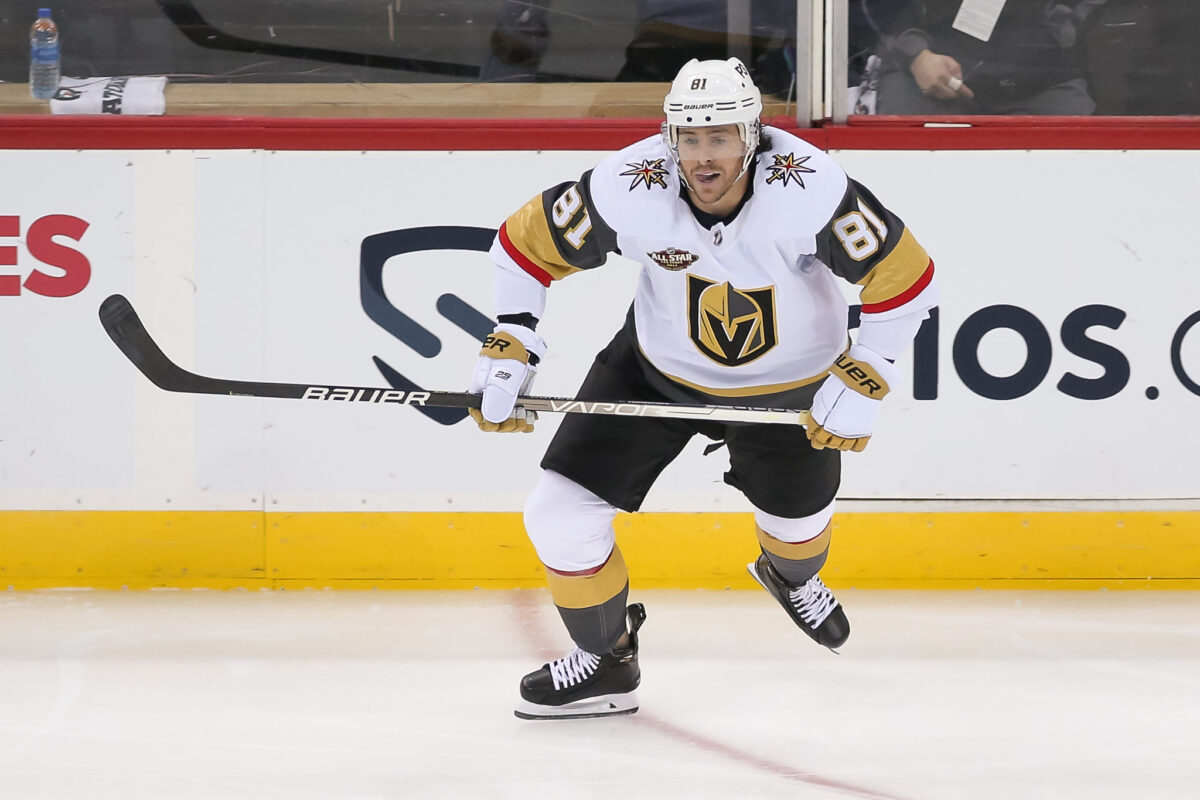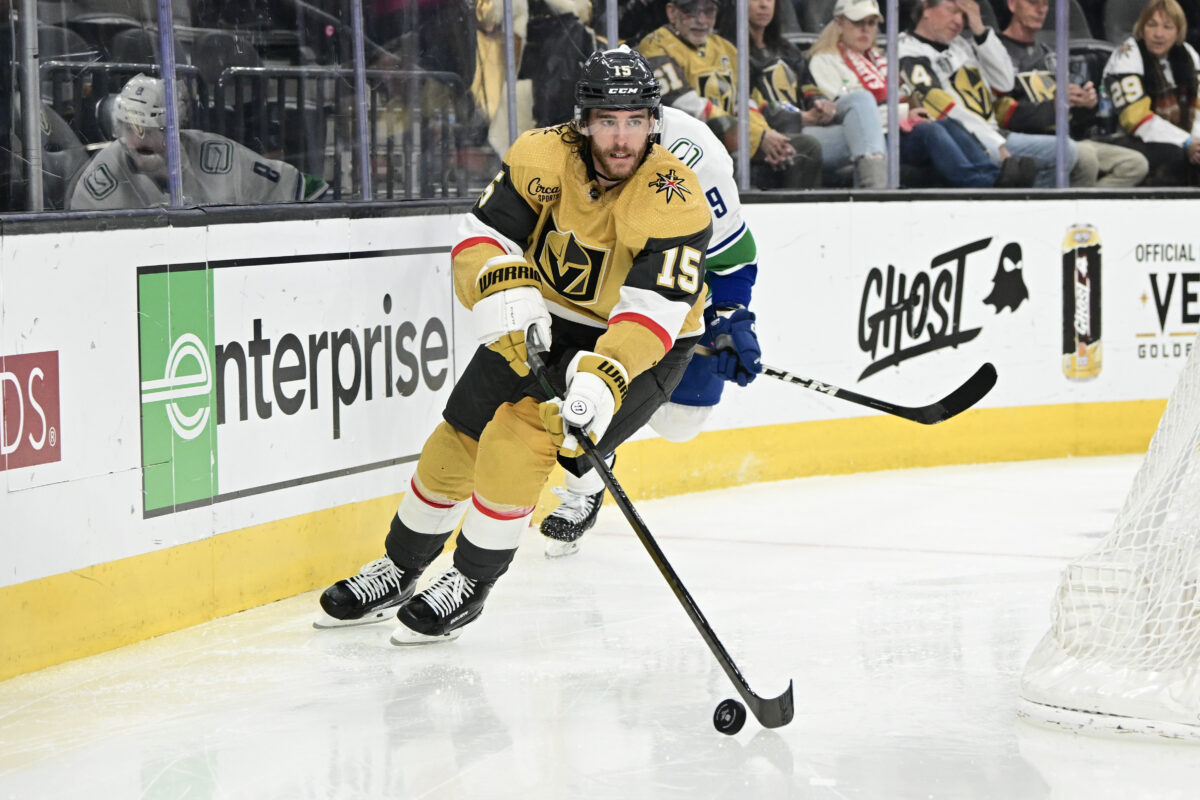After an eventful trade deadline for the Vegas Golden Knights, things have begun to trend in the right direction. Following a stretch between Feb. 12 and March 7 where they lost nine of 11 games, they’ve managed to win two of their last three and continue to crawl back up the Pacific Division standings.
While Golden Knights general manager Kelly McCrimmon deserves a ton of credit for the deals he was able to pull off earlier this month, the future looks even more complicated now than it already did. With seven roster players becoming unrestricted free agents later this year, McCrimmon will have to make some pivotal decisions that could drastically change the makeup of this roster.
Related: Impact of the Golden Knights’ Trade Deadline Moves
The list of pending free agents includes Conn Smythe Trophy winner Jonathan Marchessault, Anthony Mantha, Chandler Stephenson, William Carrier, Michael Amadio, Noah Hanifin, and Alec Martinez. These players combine for just over $19 million in salary on the Golden Knights, but that doesn’t feel nearly as good as it sounds when you consider the amount of salary that has been retained on some of those contracts.
The Tenured Golden Knights
Marchessault headlines this list, and for good reason. The 35-year-old original Misfit is in the midst of the sixth and final year of his $30 million deal signed in 2018, which has turned into one of the most valuable contracts in the league. It’s concerning that there hasn’t been an extension already signed, but there are cautionary reasons from both the team and player perspectives.
Marchessault has been an integral part of the team’s identity both on and off the ice, but the Reilly Smith trade last season proves that McCrimmon is still a manager that carries a business-first mindset. He could be pricing himself out of the Golden Knights’ lineup with the impressive season he’s had, which means Marchessault is going to have to take less money than he would get on the open market to stay with the team.
There are few players who could replace what Marchessault brings to the Golden Knights, but paying $7-8 million for a 35-year-old would be considered a bad managerial decision in most circumstances. If both parties can get on the same page for the appropriate length of an extension, then Marchessault will likely retire a Golden Knight.

It feels like the writing was on the wall for Chandler Stephenson once the Golden Knights acquired Tomas Hertl from the San Jose Sharks. His offensive drive and overall playmaking ability have significantly decreased, which was the only thing that masked his defensive shortcomings in his time with the franchise.
After two 60-plus point seasons and an impressive performance in the playoffs last year, Stephenson has built the resumé that will undoubtedly earn him a raise from his modest $2.75 million salary. Although, it’s unlikely that his paycheques will come from the Golden Knights next season.
William Carrier and Michael Amadio essentially fit into the same category, with Amadio having a bit more offensive upside as a two-way scoring threat who has found success on all four lines at different points with the Golden Knights. While Carrier offers a lot more defensively, Amadio is no slouch in his own zone either, and has become a mainstay on the second penalty-killing unit this season.
Carrier’s injuries have also become a growing concern, playing just 90 games over the last two seasons. The 29-year-old’s absence has given Amadio an opportunity to take on a bigger role, and he’s thrived. Both are on great contracts for what they bring to the team and there’s still a scenario where both players are re-signed, but given the tight restraints that the Golden Knights will be under, it’s more likely that one will be picked over the other.
For Alec Martinez, it feels like the best decision is retirement. With three Stanley Cups under his belt, the 36-year-old shot-blocking machine has solidified himself as one of the best defensive defensemen in the modern era, and would put himself in elite company if the Golden Knights can repeat with another championship this season.
Playing as fearlessly as Martinez does comes with its downsides, as countless injuries have plagued him throughout his career. For that reason, it’s unlikely that he’ll suit up with the Golden Knights next season, or maybe in any uniform. However, playing over 800 games in a league that doesn’t value the role he plays nearly as much as it did when he entered, it’s hard to not consider his career an overwhelming success.
The New Acquisitions
As many trades as the Golden Knights have made in the past, not many have been rental deals. Outside of the acquisitions of Teddy Blueger and Jonathan Quick at last season’s deadline, the Golden Knights have prioritized extending the players they trade for. McCrimmon deserves credit for finding players that fit right, but it leads to tougher decisions in the future.
Noah Hanifin is on the record saying that the list of potential trade suitors he gave to the Calgary Flames ahead of the deadline were teams he was interested in staying with. With an aging defensive core, Hanifin has addressed the need for an elite presence on the left side for the Golden Knights this season. Looking at the price they paid to acquire him, it seems like there is mutual interest in an extension in the near future.

Anthony Mantha is in a very unique position compared to the other players on this list. While he likely isn’t a top priority for the Golden Knights right now, he could quickly become the most important forward re-signing if they can’t come to terms with Marchessault.
While his traditional stats throughout his career don’t jump off the page, largely due to his injury history, Mantha has quietly been one of the best even-strength goal scorers in the league. He’s scored 21 goals this season and is on pace for a career-high, while also sitting at seventh in goals per-60 minutes (G/60) at 5-on-5 in the NHL (1.46).
For context, some of the other names just slightly ahead of him are Nathan MacKinnon (1.49, sixth), his teammate Jonathan Marchessault (1.59, fifth), and Auston Matthews (1.76, second). This isn’t to say that Mantha is as valuable as those players, but for a team that is at its best when they are dominating at even strength, this was a great addition.
His price tag will be higher than the $2.85 million that the Golden Knights are currently paying him after salary retention, but possession metrics and per-60 rates only bring a player’s value up so high before the actual output matters more. If Mantha can surpass the 25-goal mark for the first time in his career and be a key contributor in the playoffs, he could earn himself a contract within the range of $6-7 million. Are the Golden Knights willing to pay that? Only time will tell.
Final Thoughts
Fortunately for the Golden Knights, all indications from league sources seem to point to the salary cap increasing next year, which will give McCrimmon a bit more flexibility to try and retain as many assets as he can.
While there are still a lot of impactful players that are locked up long-term, this offseason will likely be the most important for the Golden Knights in their seven-year history. They’ve mortgaged so much of their future to keep this competitive window open as long as possible, and their innovative team-building method will be put to the ultimate test in the next few months.
